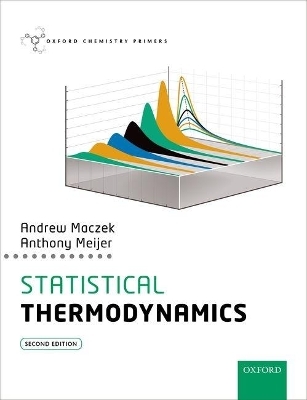
Statistical Thermodynamics
Oxford University Press (Verlag)
978-0-19-877748-9 (ISBN)
The renowned Oxford Chemistry Primers series, which provides focused introductions to a range of important topics in chemistry, has been refreshed and updated to suit the needs of today's students, lecturers, and postgraduate researchers. The rigorous, yet accessible, treatment of each subject area is ideal for those wanting a primer in a given topic to prepare them for more advanced study or research.
The learning features provided, including end of book problems and online multiple-choice questions, encourage active learning and promote understanding. Furthermore, frequent diagrams and margin notes help to enhance a student's understanding of these essential areas of chemistry.
Statistical Thermodynamics gives a concise and accessible account of this fundamental topic by emphasizing the underlying physical chemistry, and using this to introduce the mathematics in an approachable way. The material is presented in short, self-contained sections making it flexible to teach and learn from, and concludes with the application of the theory to real systems.
Online Resource Centre:
The Online Resource Centre to accompany Statistical Thermodynamics features:
For registered adopters of the text:
· Figures from the book available to download
For students:
· Worked solutions to the questions and problems at the end of the book.
· Multiple-choice questions for self-directed learning
Andrew Maczek, until his retirement, was a Senior Lecturer in Physical Chemistry at the University of Sheffield, where his research focused on the thermophysical behaviour of fluids. He obtained his first degree in Chemistry at the University of Oxford, where he stayed on to obtain his DPhil in Inorganic Chemistry with Courtney Philips. During a postdoctoral period at the University of Leeds he came under the influence of Peter Gray and happily converted to become a physical chemist. The first edition of this Primer was written during the years while he was actively engaged in academic pursuits at Sheffield. Anthony Meijer is a reader in Theoretical Chemistry at the University of Sheffield, where he and his research group work on the theoretical study of chemical reactions using both electronic structure and quantum dynamics methods for a wide variety of systems from the formation of molecules in the interstellar medium to the vibrational control of electronically excited states. He obtained an MSc in Chemistry from the University of Utrecht before obtaining a PhD with Ad van der Avoird at the University of Nijmegen. He has been at Sheffield for the past 13 years.
1: The Boltzmann law
2: Sum over states: the molecular partition function
3: Applications of the molecular partition function
4: From molecule to mole: the canonical partition function
5: Distinguishable and indistinguishable particles
6: Two-level systems: a case study
7: Thermodynamic functions: towards a statistical toolkit
8: The ideal monatomic gas: the translational partition function
9: The ideal diatomic gas: internal degrees of freedom
10: The ideal diatomic gas: the rotational partition function
11: ortho and para spin states: a case study
12: The ideal diatomic gas: the vibrational partition function
13: The electronic partition function
14: Heat capacity and Third Law entropy: two case studies
15: Calculating equilibrium constants
Questions and Problems
Additional Mathematical Aspects
| Erscheinungsdatum | 02.06.2017 |
|---|---|
| Reihe/Serie | Oxford Chemistry Primers |
| Zusatzinfo | 24 line drawings |
| Verlagsort | Oxford |
| Sprache | englisch |
| Maße | 189 x 247 mm |
| Gewicht | 248 g |
| Themenwelt | Naturwissenschaften ► Chemie ► Physikalische Chemie |
| ISBN-10 | 0-19-877748-5 / 0198777485 |
| ISBN-13 | 978-0-19-877748-9 / 9780198777489 |
| Zustand | Neuware |
| Haben Sie eine Frage zum Produkt? |
aus dem Bereich


